– US manufacturing contracted for a second straight month, with the manufacturing PMI index issued by the Institute for Supply Management coming in at 48.4 for December, the lowest since May 2020.
– Exceeding analysts’ forecasts, the decline in manufacturing – accounting for 11.3% of the US economy – is perceived by many as a harbinger of a soon-to-come recession. – A robust labor market is by now pretty much the only thing keeping the US from plunging into a recession, though the December report is to be published this Friday. – The ISM’s forward-looking new orders index plummeted even lower to 45.2, well below the 50 threshold that indicates contraction. falling for the fourth straight month. 2. Russian Oil Exports Edge Lower in December
– Russian seaborne crude exports dropped to a two-year low last month to 2.65 million b/d as the introduction of the oil price cap brought deliveries to Europe to an absolute minimum.
– Bulgaria, which has a two-year exemption until the end of 2024, appears to be the only EU country still taking Russian crude as the rest is being moved to Asia. – The Kremlin vowed to ban all crude exports to countries observing the oil price cap in late December as Russian firms ramped up purchases of “shadow” tankers to transport their oil. – Even though the product price cap will go online…
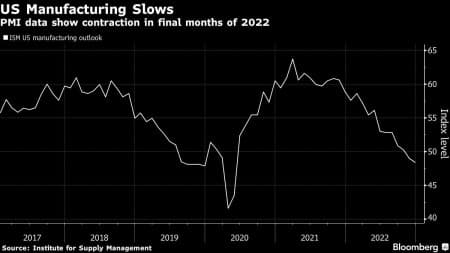
– US manufacturing contracted for a second straight month, with the manufacturing PMI index issued by the Institute for Supply Management coming in at 48.4 for December, the lowest since May 2020.
– Exceeding analysts’ forecasts, the decline in manufacturing – accounting for 11.3% of the US economy – is perceived by many as a harbinger of a soon-to-come recession.
– A robust labor market is by now pretty much the only thing keeping the US from plunging into a recession, though the December report is to be published this Friday.
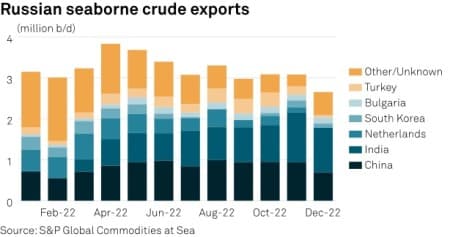
– Russian seaborne crude exports dropped to a two-year low last month to 2.65 million b/d as the introduction of the oil price cap brought deliveries to Europe to an absolute minimum.
– Bulgaria, which has a two-year exemption until the end of 2024, appears to be the only EU country still taking Russian crude as the rest is being moved to Asia.
– The Kremlin vowed to ban all crude exports to countries observing the oil price cap in late December as Russian firms ramped up purchases of “shadow” tankers to transport their oil.
– Even though the product price cap will go online in a month on February 5, Russian product exports into the EU continue so far uninterrupted, totaling 1.2 million b/d.
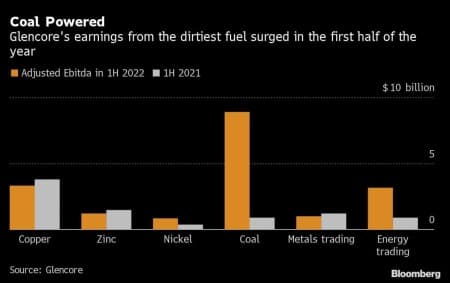
– Glencore shareholders with 2.2 trillion of assets under management will vote in May on a resolution that might force the company’s executives to explain how coal fits into the international trading house’s sustainability plans.
– Coal has accounted for more than 50% of the Swiss-based company’s H1 2022 profits, coming in at $9.5 billion, triggering the ire of global warming-conscious investors.
– Before coal exports were this lucrative, Glencore promised to cap its coal production at 2019 levels and reach net-zero operations by 2050, putting an end to thermal coal mining by then.
– Last year, Glencore traded 67.7 million tons of thermal coal and mined 103.3 million tons, retaining its title of the world’s largest coal trader and Australia’s top producer.
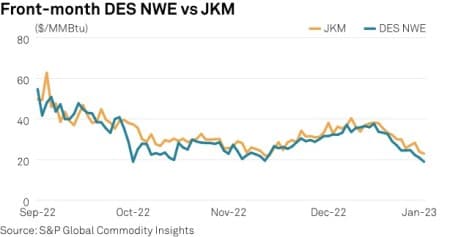
– The European gas markets have slid into contango as counter-seasonally warm weather and a robust flow of incoming LNG have depressed spot-traded natural gas prices.
– At the turn of the year prices of LNG delivered into Northwest Europe fell below Asia’s JKM index, remaining there since and dropping below the $20 per mmBtu mark for the first time since May 2022.
– With the first week of January being the hottest ever recorded in at least eight EU countries, gas inventories have seen several consecutive days of stock builds, currently at 83% of capacity.
– European gas and power contracts delivering in Summer-23 and Q4-23 still price in a risk premium of lower inventories and reflect Germany’s soon-to-come nuclear halt in April 2023.
5. China Close to Lifting Australia Coal Ban

– Three state-owned electricity generating companies have reportedly received intimations from the government to resume purchases of thermal and coking coal from Australia.
– Despite ramping up domestic production and hiking imports from other sources such as Mongolia, Russia, or Indonesia, Beijing sees the normalization as a key step to push prices of coal even lower.
– Australia has so far not been able to reach export levels seen before 2020, with last year’s annual export tally of 345 million tons staying 15% lower than the peak recorded in 2019.
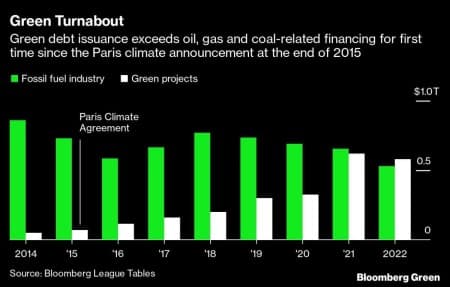
– Renewable energy projects have seen a total of 580 billion raised in the debt markets last year, topping fossil fuel financing (530 billion) for the first time in history, Bloomberg reports.
– At the same time, analysts signal that as much as “green lending” is on the rise, the result is skewed because oil companies, thanks to high crude prices, have lowered their dependence on capital markets.
– Banks involved in green bonds and loans are reportedly also generating disproportionately more revenue, cashing in around $3.3 billion in fees whilst the fossil industry stood at $2.5 billion.
– French banks Credit Agricole, BNP Paribas, and Bank of America stood out as main providers of green financing, whilst oil and gas bonds were mostly served by RBC, Wells Fargo, and JPMorgan Chase.
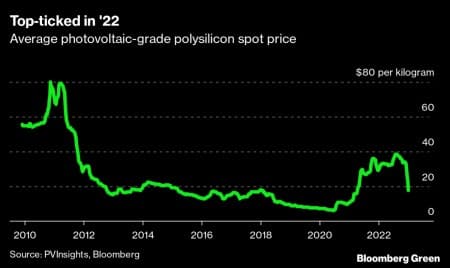
– A key element in producing solar panels, solar-grade polysilicon has seen its prices collapse over the recent months amidst tepid demand and rapidly expanding Chinese supply.
– Having hit their highest level in a decade this autumn at $38/kg, polysilicon prices have effectively halved to $17.5/kg currently in less than two months.
– The drop in polysilicon prices will lower the price of solar panels and stimulate global demand, so in a sense, China’s overproduction will create a deeper market for its produce.
ADVERTISEMENT
ADVERTISEMENT